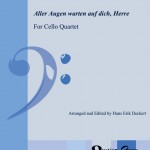Before J.S. Bach, there was Heinrich Schütz. The most important German composer of his generation, Schütz lived during the times of the Early Baroque and is often considered the greatest German composer before Bach. He also lived during a period of great struggle, the Thirty Years War, which his land of residence (Saxony) became involved in.
During his life, Schütz made major contributions to the Baroque repertoire. However, many of his works have since been lost, including Dafne, the first German opera. Church music comprises a large part of his remaining works, and his career in the service of the Electors of Saxony in Dresden and the Dresden court chapel was turbulent due to the constantly shifting economic and political realities as a result of the war.
Nonetheless, many of his vocal settings have survived to modern day. Now, thanks to editor Hans Erik Deckert, two of these dramatic and rhythmic vocal compositions are available for cello ensemble.
About Schütz’s Aller Augen warten auf dich for Cello Quartet
Aller Augen warten auf dich is a short prayer sung by a 4-part choir. Deckert’s arrangement stays in the original key and highlights Schütz’s talent for creating succinct compositions.
English translation:
All the eyes look to You, Lord
and Thou give them their food in due time.
You open Your hand and satisfy the desire
of every living thing.
About Schütz’s Unser Wandel ist im Himmel for Cello Sextet
Unser Wandel ist im Himmel for Cello Sextet is one of the 29 motets from the choir work Geisliche Chormusik. This is a very expressive work from the early baroque period. Again, Deckert keeps his arrangement in the original key.
English translation:
Our homeland is in heaven;
from where we also look for the Savior,
Jesus Christ the Lord.
Who shall transform our earthbound body,
so that it will be like His glorious body,
using to the power with which
All things are made humble under Him.
About the Editor – Hans Erik Deckert
Hans Erik Deckert was born and grew up in Germany. The son of German and Danish parents, he moved to Denmark shortly after the war in order to study cello and conducting in Copenhagen. Deckert has had a passionate and prolific career in these fields, as well as in chamber music. His roots in the German musical tradition have given him a depth of musicianship much in demand at solo and chamber masterclasses and seminars, which is mixed with a concern for the wider social responsibility of music, stemming from his Scandinavian environment.
For Ovation Press, Deckert has employed this musicianship in a wide number of arrangements of varying styles: including Bach’s Four Canons from The Art of Fugue, Rachmaninoff’s Vocalise, Saint-Saëns’ The Swan, and much more.
Presently Hans Erik Deckert is Honorary President of the Danish section of ESTA (which he also founded in 1978) and resident conductor with the Cello Academy (which embraces a professional 12-part cello ensemble as well as regular training courses for students). He also holds a visiting post at the Freie Musikschule in Hamburg.
Learn more about Hans Erik Deckert and his arrangements at Ovation Press.
All of these scores are available for download exclusively at Ovation Press. If you want to be kept updated on the latest scores from Ovation Press, be sure to join our mailing list!
















No comments yet.